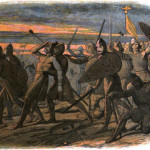
We last left Edward the Confessor, king of England, as he died in January 1066 without leaving any offspring to succeed him. Who was going to be the next king of England? Would it be Duke William of Normandy, a distant cousin, or Earl Harold Godwin? What about the small child named Edgar brought back to England from Hungary by King Edward? Edgar’s family was part of a branch of Edward’s family exiled many years earlier (about the same time Edward was forced into exile in Normandy).
The Battle of Hastings
Let’s fast forward nine months to October 1066. A lot has happened between Edward’s death and October. Duke William gets annoyed that Harold has been crowned king of England after the crown had reportedly been offered to him by Edward (and Harold even went so far as to take a solemn oath to support William in this regard). So what does Duke William do? He puts together a fleet of Norman soldiers and invades England to claim his crown (William’s wife, Matilda, funds and outfits the ship William would sail in).
He and his men meet Harold and the Anglo-Saxon warriors on a hilly field in Hastings, a small village about an hour away from London on the southern coast of England. It was a fierce battle but in the end, Harold is killed and Duke William becomes the next king of England. He is now known for posterity as William the Conqueror. The future of England and France is changed forever. By the way, the next time this happens is on D-Day, 6 June 1944, when the invasion is reversed.
The Aftermath

Photo by Sandy Ross
The destinies of France and England become intertwined with English claims on French territories: the French confiscate English territories and the English confiscate French territories. English kings become French kings and vice versa. History plays out through pre-arranged marriages based on building empires, wealth, and treaties. In the meantime, French cities are sieged, and wars become commonplace. The longest war became known as the Hundred Years War (1337–1453). The common denominator throughout this period is that millions of innocent people were killed either through conflict or the plague.
It really wasn’t a constant conflict during the Hundred Years War. In fact, there were only four major battles that frame this time period. The most important one was the Battle of Agincourt in 1415. Despite a far inferior sized army, the English were the victors. Over 40% of the French army was killed and the English king, Henry V, ordered all French prisoners to be killed.
This battle created the stage for one of the most interesting phases of this period. The French king, Charles VI, was going mad. This set up the conflict between his cousin, John the Fearless, and his brother, Louis of Orléans. John the Fearless (the Burgundians) had Louis (the Armagnacs) murdered in November 1407. He confessed to the crime, but despite murdering the king’s brother, John was never punished. Over the next four decades, Paris was a pawn in the fight between the Armagnaces and the Burgundians (they aligned themselves with the English). The English controlled and occupied Paris between 1420 and 1453. Joan of Arc attacked the city in September 1429 in an attempt to free it from the English. She was unsuccessful and eventually was captured by the Burgundians and turned over to the English. At the age of 19, she was betrayed by the French and the king she put on the throne of France.
Our next blog post will complete this trilogy of stories. It will be about the Bayeux Tapestry. This remarkable embroidery has survived more than 900 hundred years and tells us the story of the Battle of Hastings and events leading up to it. Stay tuned.
Do we have a lot of stories? Of course we do. I’m looking forward to sharing these with you. Please continue to visit our newsletter and blog. Perhaps you’d like to subscribe so that you don’t miss out on the most recent newsletter and blog posts.
Thanks so much for following my newsletter and blogs as well as my little journey through this incredibly interesting process of writing a series of niche historical walking tour books.
– Stew
Please note that I do not and will not take compensation from individuals or companies I mention or promote in my blog.
Are you following us on Facebook and Twitter?
Copyright © 2014 Stew Ross
